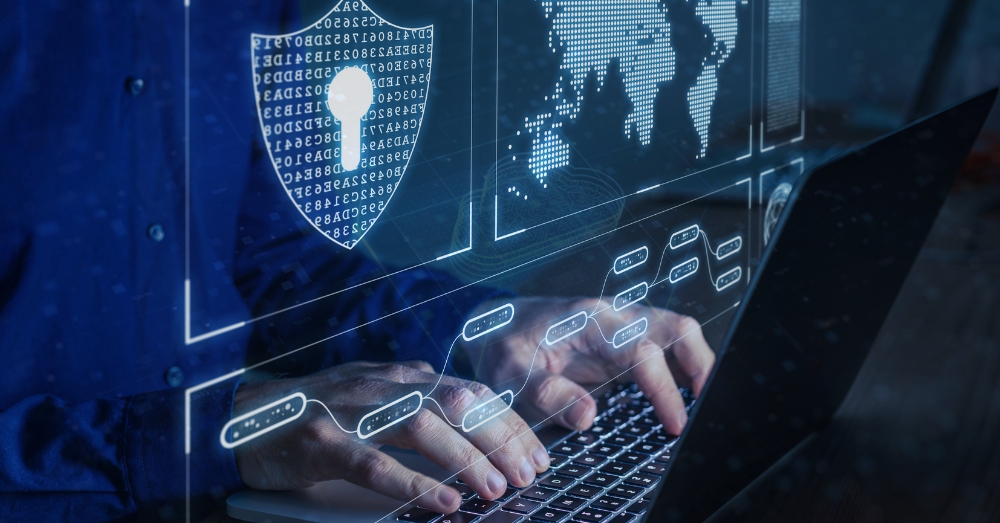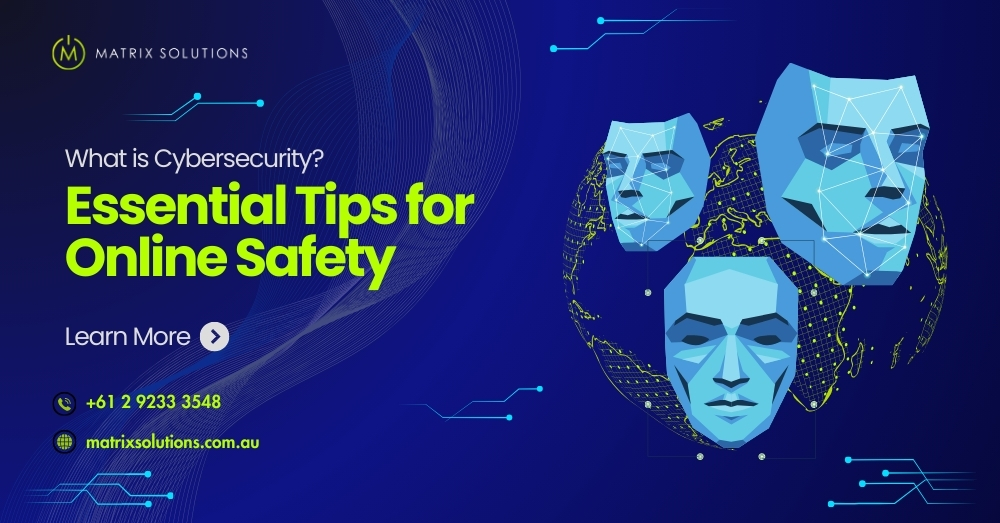Cybersecurity is the practice of protecting systems, networks, and data from digital attacks. But what is cybersecurity in more detail? At its core, cybersecurity involves a range of techniques and technologies designed to safeguard computer systems and sensitive information from threats like hacking, malware, and data breaches. It’s essential for maintaining the integrity, confidentiality, and availability of data in today’s digital age. As cyber threats become increasingly sophisticated, understanding what cybersecurity entails is crucial for individuals and businesses alike to defend against potential risks effectively.
Why is Cybersecurity important?
Our lives are increasingly intertwined with technology, where cyber threats lurk around every digital corner. Hackers relentlessly seek ways to exploit vulnerabilities through malicious software or deceptive scams to steal your data. This is precisely why the importance of cybersecurity cannot be overstated.
Safeguarding yourself begins with strong passwords, regular software updates, and caution when clicking on links or opening attachments. Be mindful of the information you share online and use security software to add an extra layer of protection. Cybersecurity protects our digital lives, which are now inseparable from our personal and professional activities. Here’s why cybersecurity is crucial in various aspects of our lives:
- Personal Protection: Safeguards personal information like banking details, social security numbers, and health records.
- Financial Security: Prevents unauthorised access to financial accounts and online transactions.
- Business Continuity: Protects businesses from data breaches, ransomware attacks, and other disruptions that can cause significant financial losses and damage reputation.
- National Security: Protects critical infrastructure and government systems from cyberattacks that could have far-reaching consequences.
By prioritising cybersecurity, we create a safer digital environment for everyone.
What are Cybersecurity Services?
Cybersecurity services are a range of solutions designed to protect your organisation’s digital assets from threats such as hacking, data breaches, and malware. These services include basic security measures like firewalls and antivirus software, as well as advanced strategies such as threat intelligence, incident response, and vulnerability management.
Often provided by Managed IT services providers, these experts integrate cybersecurity measures into their comprehensive managed IT services. This ensures that your business remains secure, compliant, and resilient against cyber attacks. By leveraging cybersecurity services from a Managed IT services provider, you gain access to advanced security protocols, continuous monitoring, and timely threat mitigation, keeping your digital environment safe and robust.
Implementing comprehensive cybersecurity services helps businesses safeguard sensitive information, ensure compliance with regulatory requirements, and maintain customer trust. These services are essential in today’s digital age, where cyber threats are constantly evolving and becoming more sophisticated.
A robust cybersecurity services strategy typically involves:
- Risk assessment and management: Identifying potential threats and vulnerabilities and implementing mitigation measures.
- Network Security: Protecting your network infrastructure from unauthorised access and attacks.
- Data Protection: Ensuring the confidentiality, integrity, and availability of your data.
- Threat Intelligence: Monitoring and analysing threat data to anticipate and defend against cyber attacks.
- Incident Response: Developing and executing a plan to respond to and recover from security incidents.
What are the different types of Cybersecurity Threats?
Cybersecurity threats constantly evolve, posing significant risks to individuals, businesses, and nations. Understanding the types of cyber attacks is crucial for implementing effective defence strategies.
Phishing
Phishing attacks involve deceptive emails or messages that appear to be from legitimate sources. They trick recipients into divulging sensitive information like passwords or credit card details.
Techniques in social engineering
Social engineering exploits human psychology to manipulate individuals into revealing confidential information or performing actions that compromise security. These attacks often involve impersonation, pretexting, or baiting.
Ransomware attacks
Ransomware is malicious software that encrypts a victim’s files, demanding payment for decryption. These attacks can cripple businesses and individuals, causing significant financial losses and data breaches.
SQL injection vulnerabilities
SQL injection attacks target websites and applications by injecting malicious SQL code into their databases. This can lead to unauthorised access to sensitive data, data modification, or even a complete system takeover.
The threat of Malware
Malware encompasses various types of malicious software, including viruses, worms, Trojans, and spyware. These programmes can infect devices, steal data, monitor user activity, or disrupt system operations.
Distributed denial of service (DDoS) disruptions
DDoS attacks overwhelm websites or online services with a flood of traffic, rendering them inaccessible to legitimate users. These attacks can cause significant disruptions, financial losses, and reputational damage.
Understanding these different types of cyber threats is the first step towards protecting yourself and your organisation. By staying informed and implementing robust security measures, individuals and organisations can mitigate the risks posed by these evolving threats.
Cybersecurity measures you can take to protect your digital space

Implementing cybersecurity measures is essential for protecting your digital presence and ensuring the security and integrity of both personal and professional digital assets. Here are some effective cybersecurity measures you can take:
Safeguarding critical infrastructure
Safeguarding critical infrastructure, such as power grids, transportation networks, and financial institutions, protects public safety and maintains societal stability.
Protecting these essential systems and services requires a multi-layered approach. This involves implementing robust access controls, network segmentation, intrusion detection systems, and regular vulnerability assessments.
Enhancing application security
Software applications can have weaknesses that cybercriminals exploit. To protect against this, developers should use secure coding practices, regularly test for vulnerabilities, and quickly fix the flaws identified.
Strengthening information security
Information security protects sensitive data from unauthorised access, theft, or misuse, ensuring privacy, trust, and the security of valuable assets. This means protecting things like your personal details, money matters, and any special ideas or creations you have. We can do this by using strong passwords, scrambling the data so others can’t read it, limiting who can see the information, and having ways to stop it from getting lost or stolen.
Fortifying network security
Network security is essential for safeguarding sensitive data, preventing cyber-attacks, ensuring business continuity, maintaining trust, and complying with regulations. To achieve these goals, network security employs various tools and technologies such as firewalls, intrusion prevention systems, virtual private networks (VPNs), and network monitoring tools to detect and prevent unauthorised access and malicious activity.
Mobile security measures
As mobile devices become increasingly central to our lives, securing them is essential. This involves using strong passwords or biometric authentication, keeping software updated, installing security apps, and being cautious of public Wi-Fi networks.
Endpoint security enhancements
Endpoints, such as laptops, desktops, and servers, are potential entry points for cyberattacks. Endpoint security solutions, including antivirus and anti-malware software, device encryption, and application whitelisting, can help protect these devices from compromise.
What are the benefits of implementing Cybersecurity Services?

Implementing robust cybersecurity measures not only mitigates risks but also strengthens your overall digital foundation. Here are some major benefits of implementing cybersecurity:
Defence against cyber threats
Cybersecurity acts as a shield, protecting your systems and data from various cyber threats, such as malware, ransomware, phishing attacks, and unauthorised access attempts. By implementing robust security measures, you can significantly reduce the risk of falling victim to these malicious activities.
Protection of sensitive data
Whether it’s personal information, financial records, or confidential business data, cybersecurity ensures that your sensitive information remains secure and confidential. Encryption, access controls, and other security measures safeguard your data from unauthorised access or disclosure.
Guaranteeing business continuity
Cyberattacks can disrupt operations, leading to downtime, financial losses, and reputational damage. Cybersecurity measures help prevent such disruptions, ensuring that your business can continue functioning smoothly even in the face of cyber threats.
Establishing customer trust
In an era of frequent data breaches, customers are increasingly concerned about the security of their information. By demonstrating a strong commitment to cybersecurity, you can build trust with your customers and reassure them that their data is safe in your hands.
Adhering to regulatory compliance
Many industries are subject to stringent data protection and privacy regulations. Implementing cybersecurity measures helps you comply with these regulations, avoiding costly fines and potential legal battles.
Gaining a competitive edge
A robust cybersecurity posture strengthens businesses by ensuring uninterrupted operations, fostering innovation, attracting top talent, and reducing costs while adhering to regulations. This proactive approach differentiates your business in a security-conscious market, attracting customers and partners who prioritise safety and reliability.
Cost efficiency and risk reduction
While investing in cybersecurity may seem like an expense, it can actually save you money in the long run. By preventing cyberattacks, you avoid the costs associated with data recovery, system repairs, legal fees, and lost business. Additionally, cybersecurity measures help you identify and mitigate risks early on, reducing the likelihood of costly incidents.
Best practices and technologies in cybersecurity
Staying safe in the digital world requires a combination of smart habits and the right tools. Here are some essential practices and technologies you can use to protect yourself:
Update software and systems regularly
Software updates often contain patches that fix security vulnerabilities. Make sure you regularly update your operating system, applications, and antivirus software to stay ahead of potential threats.
Deploy Anti-Virus software
Anti-virus software is essential for detecting and removing malware. Choose a reputable antivirus programme and keep it up to date for optimal protection.
Create robust passwords
Weak passwords are an easy target for hackers. Use strong, unique passwords for each of your online accounts, and consider using a password manager to securely store them.
Implement Two-Factor authentication
Two-factor authentication (2FA) adds an extra layer of security by requiring a second verification step, like a code sent to your phone, in addition to your password. Enable 2FA whenever possible for your most important accounts.
Take cautions against suspicious E-mail attachments
Phishing emails often contain malicious attachments that can infect your device with malware. Be wary of unsolicited emails or attachments, even if they appear to be from trusted sources.
Take security precautions for public WiFi usage
Public Wi-Fi networks can be insecure, making it easy for hackers to intercept your data. Avoid accessing sensitive information or making financial transactions on public Wi-Fi, and consider using a virtual private network (VPN) for added security.
Use VPNs
VPNs create a secure, encrypted tunnel for your internet traffic, protecting your online activity from prying eyes. Use a VPN when accessing sensitive information on public Wi-Fi or when you want to enhance your online privac
Use of disaster recovery and backup
Regularly back up your important data to an external hard drive or cloud storage. In the event of a cyberattack or data loss, having a backup can help you recover your information quickly and minimise downtime.
Who needs Cyber Security? and why?
Cybersecurity is essential for everyone who interacts with technology. Here’s why each needs cybersecurity:
Business entities
Businesses of all sizes are prime targets for cybercriminals seeking valuable data. Robust cybersecurity safeguards customer information, financial records, and intellectual property, ensuring business continuity and protecting against financial loss and reputational damage.
Professional individuals
Professionals, particularly those handling sensitive client data, need cybersecurity to uphold client confidentiality and protect their personal information. Cybersecurity measures safeguard against identity theft and secure intellectual property, preserving both personal and professional integrity.
General public
Even those who don’t own businesses or handle sensitive data are vulnerable to cyber threats. Cybersecurity is essential for protecting personal information, securing online accounts, and preventing malware infections that can compromise devices and disrupt daily life.
The evolution of Cyber Threats over time
Cyber threats have evolved significantly over time, mirroring rapid technological advancements.
In the early days of the internet, threats were relatively simple, often involving viruses and malware aimed at disrupting systems. The 1990s saw the rise of the internet, leading to a surge in cybercrime, with hackers exploiting vulnerabilities for financial gain.
The 2000s brought about more sophisticated threats like phishing and identity theft, as well as the emergence of organised cybercrime groups. In the 2010s, threats became even more complex, with state-sponsored attacks and the rise of ransomware.
Today, we face a constantly evolving threat landscape, with artificial intelligence and machine learning being leveraged by both attackers and defenders. Looking ahead, it’s clear that cyber threats will continue to evolve, necessitating constant vigilance and adaptation to ensure our digital safety.
How has AI influenced cybersecurity?
Artificial intelligence (AI) has revolutionised cybersecurity, offering opportunities and challenges. AI-powered tools can analyse vast amounts of data to detect patterns and anomalies, enabling faster and more accurate identification of threats like malware and phishing attacks. Machine learning algorithms can adapt and learn, improving their ability to detect new and evolving threats.
However, malicious actors can also use AI to create more sophisticated attacks, such as AI-generated phishing emails or deepfakes. The increasing use of AI in cybersecurity highlights the need for continued research and development to ensure that AI is used ethically and responsibly to protect against cyber threats.
Partner with Matrix Solutions for your Cyber Security needs
Matrix Solutions is your go-to Managed IT Services Provider in Australia, offering exceptional cybersecurity and full-spectrum IT services to businesses across the country. Our solutions are tailored to protect your data and optimise your technology infrastructure.
We provide comprehensive services, including cybersecurity, cloud solutions, IT consulting and outsourced IT. Our skilled professionals ensure your business is protected from cyber threats and runs efficiently.
Trust Matrix Solutions to be your IT partner. Contact us now to secure your business and leverage our expertise for optimal IT performance.
Optimise Your IT Infrastructure!
Discover the Key to Efficiency and Success With Matrix Solutions’ Managed IT Services.







